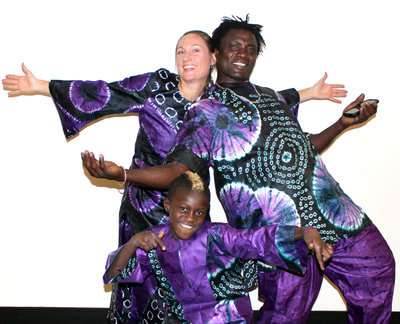
Before moving to Eugene, Alseny Yansane danced for Ballets Africains, the most prestigious dance troupe in the West African nation of Guinea.
But there’d be no mistaking his moves for anything from Swan Lake.
Low squats, flips, rapid sideways motions, windmill arm movements — these are some of the most common hallmarks of the dozens of dances that can be found across Guinea and which Yansane and his wife Andrea Yansane teach at the West African Cultural Arts Institute (WACAI) here in Eugene.
Like ballet, Guinean dance is physically demanding, but unlike ballet with its liquid motions, Guinean dance looks exhausting to those who’ve barely dabbled in the dance world. Even to experienced dancers, it can seem daunting, and the polyrhythmic, drum-oriented music that accompanies it doesn’t make it seem much friendlier.
“It was a totally different movement than I’d ever danced,” says Colette Ramirez, a community events manager for Eugene’s Cultural Services division. Ramirez has taken WACAI classes for eight years after growing up dancing ballet. “Whereas in ballet you’re controlled and tight, in West African dance you have more free movement.”
The Yansanes try to make these esoteric dances as accessible as possible. Andrea Yansane teaches a beginner’s class Tuesday nights at Xcape Dance Academy on 12th and Lawrence, while Alseny Yansane hosts an all-levels dance class Saturday mornings at the WOW Hall.
“I find that people have the misconception they can’t participate because they’ve perhaps seen a performance of it,” Andrea Yansane says. “We work on breaking steps down and simplifying them so people who have just walked in for the first time can benefit.”
Both Yansanes — Guinean-born Alseny and American-born Andrea — trained in Guinea. The couple seeks to bring this experience to their students through a study-abroad program in the Guinean capital of Conakry, where students take three-week courses taught by both the Yansanes and professional dancers and drummers from prestigious dance groups. The next group heads to Guinea Dec. 16 through Jan. 5.
Part of the impetus to teach abroad comes from what the Yansanes see as the importance of emphasizing the cultural context from which these dances developed. Dancing is a major part of everyday Guinean life and is present at just about any social gathering you can name, from formal occasions like baby-naming ceremonies to casual village parties and gatherings.
In their classes, the Yansanes are sure to meticulously explain the origin of each dance and musical style. “They weren’t created in a vacuum, they were created in a specific cultural context,” Andrea Yansane says. “And a lot of that context is something people can relate to, celebrating, being close to communities, being part of communities. It’s something people crave.”
Ramirez finds this sense of community to be one of the most exhilarating things about West African dance.
“It’s bright and there’s a lot of laughter, a lot of encouragement,” she says. “[WACAI is] so supportive of all ages and all levels. There’s young kids drumming and dancing, they’re with their parents, then the grandparents are there dancing, too.”
New dance classes begin in October. For more information, visit westafricanculturalarts.org.